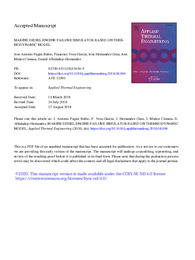Please use this identifier to cite or link to this item:
https://hdl.handle.net/11000/34155Full metadata record
| DC Field | Value | Language |
|---|---|---|
| dc.contributor.author | Pagan Rubio, Jose Antonio | - |
| dc.contributor.author | Vera-García, Francisco | - |
| dc.contributor.author | Hernandez Grau, Jose | - |
| dc.contributor.author | Muñoz Cámara, José | - |
| dc.contributor.author | Albaladejo Hernandez, Daniel | - |
| dc.contributor.other | Departamentos de la UMH::Ingeniería Mecánica y Energía | es_ES |
| dc.date.accessioned | 2024-12-16T08:16:55Z | - |
| dc.date.available | 2024-12-16T08:16:55Z | - |
| dc.date.created | 2018-11-05 | - |
| dc.identifier.citation | Applied Thermal Engineering, Volume 144, 5 November 2018, Pages 982-995 | es_ES |
| dc.identifier.issn | 1873-5606 | - |
| dc.identifier.issn | 1359-4311 | - |
| dc.identifier.uri | https://hdl.handle.net/11000/34155 | - |
| dc.description.abstract | The diesel engine is a widely used machine in naval sector both as a propeller and auxiliary generator sets, being the most critical equipment of vessel platform. Therefore, diesel engine reliability optimization has a transcendental impact on vessel availability, safety and life cycle costs. This article describes the development of a 4-stroke high speed marine diesel engine failure simulator used in military and civil vessels as the main engine of small patrols and yachts and as an auxiliary genset for larger vessels. Failure simulator is based on a one-dimensional thermodynamic model developed in AVLBoost©, adjusted and validated with experimental data from a real engine in a test bench. The developed model is able to reproduce with confinable results the effect of a large number of typical thermodynamic failures, the behavior of the engine and the effects over several parameters measured and nonmeasured. Therefore, it is possible to obtain the engine response to failures without having to provoke them in real engine and also it is possible to know the symptoms of one failure before this failure becomes dangerous for the correct behavior of the engine. In addition, this paper exposes a methodology which allows to obtain a failure simulator of any marine diesel engine. This simulator is able to identify diesel engine symptoms under failure condition and build a reliable failure database for diagnosis purposes. | es_ES |
| dc.format | application/pdf | es_ES |
| dc.format.extent | 14 | es_ES |
| dc.language.iso | eng | es_ES |
| dc.publisher | Elsevier | es_ES |
| dc.rights | info:eu-repo/semantics/openAccess | es_ES |
| dc.rights | Attribution-NonCommercial-NoDerivatives 4.0 Internacional | * |
| dc.rights.uri | http://creativecommons.org/licenses/by-nc-nd/4.0/ | * |
| dc.subject | Diesel engine modeling | es_ES |
| dc.subject | Diesel engine simulation | es_ES |
| dc.subject | Failure detection | es_ES |
| dc.subject | Diagnosis | es_ES |
| dc.subject.other | CDU::6 - Ciencias aplicadas::62 - Ingeniería. Tecnología | es_ES |
| dc.title | Marine diesel engine failure simulator based on thermodynamic model | es_ES |
| dc.type | info:eu-repo/semantics/article | es_ES |
| dc.relation.publisherversion | https://doi.org/10.1016/j.applthermaleng.2018.08.096 | es_ES |

View/Open:
1-Version postprint-copyright.pdf
2,67 MB
Adobe PDF
Share:
.png)
